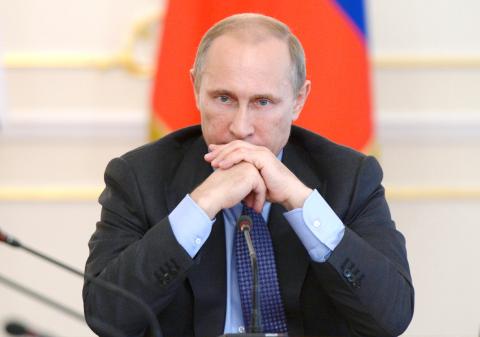A defiant Russia yesterday dismissed unprecedented Western sanctions over Ukraine after Brussels and Washington unveiled the toughest punitive measures against the Kremlin since the Cold War.
The third round of US and EU sanctions aims to force Russia to change tack and halt its support of separatists in Ukraine by targeting its vital financial, arms and energy sectors.
However, Russian Deputy Prime Minister Igor Shuvalov made light of the restrictions, also designed to hit the oligarchs in Russian President Vladimir Putin’s inner circle.

Photo: AFP
“And what about the sanctions? In for a penny, in for a pound,” he quipped to journalists.
Financial institutions put on a brave face, saying their operations would not be affected, while a top official unleashed a diatribe against the administration of US President Barack Obama.
“Obama will go down in history not as a peacemaker — everyone has already forgotten about his Nobel Peace Prize — but as a US president who started a new Cold War,” Alexei Pushkov, chairman of the foreign affairs committee at the Russian parliament’s lower house, said on Twitter.
There was no immediate official reaction from Putin’s office or the Russian Ministry of Foreign Affairs, but Moscow has long insisted sanctions would merely bring Russia’s society together and make its economy more self-reliant.
The stepped-up sanctions came as Moscow dismissed claims it was responsible for supplying the missile that downed Malaysia Airlines Flight MH17, and fighting in Ukraine showed little sign of abating.
They will notably make it tougher for Russian state-owned banks to access European financial markets, forcing their costs higher and hobbling an already struggling economy.
The Central Bank of Russia said that financial institutions were working normally and that if necessary, it would adopt measures to protect targeted lenders, which include the country’s second-largest bank, VTB.
Economists have warned that Europe’s own economy would also suffer from the so-called “sector sanctions” against its biggest source of energy and its major trading partner.
Despite the dismissive talk in Moscow, a number of economists acknowledged the new restrictions would be painful to absorb for Russia, and could stoke social tensions because its economy is sliding toward a recession.
“The current amount of corporate debt is US$700 billion; these debts should be refinanced,” FBK Strategic Analysis Institute Director Igor Nikolayev said, pointing to a lack of cheap loans in Russia.
Nikolai Petrov of the Moscow-based Higher School of Economics said that this time, the sanctions would be felt by everyday Russians — and predicted they would drive an even greater wedge between Putin and the West.
“The confrontation will increase abruptly. Putin has been practically driven into a corner and this man does not make concessions under pressure,” he said.

Seventy percent of middle and elementary schools now conduct English classes entirely in English, the Ministry of Education said, as it encourages schools nationwide to adopt this practice Minister of Education (MOE) Cheng Ying-yao (鄭英耀) is scheduled to present a report on the government’s bilingual education policy to the Legislative Yuan’s Education and Culture Committee today. The report would outline strategies aimed at expanding access to education, reducing regional disparities and improving talent cultivation. Implementation of bilingual education policies has varied across local governments, occasionally drawing public criticism. For example, some schools have required teachers of non-English subjects to pass English proficiency

‘FORM OF PROTEST’: The German Institute Taipei said it was ‘shocked’ to see Nazi symbolism used in connection with political aims as it condemned the incident Sung Chien-liang (宋建樑), who led efforts to recall Democratic Progressive Party (DPP) Legislator Lee Kun-cheng (李坤城), was released on bail of NT$80,000 yesterday amid an outcry over a Nazi armband he wore to questioning the night before. Sung arrived at the New Taipei City District Prosecutors’ Office for questioning in a recall petition forgery case on Tuesday night wearing a red armband bearing a swastika, carrying a copy of Adolf Hitler’s Mein Kampf and giving a Nazi salute. Sung left the building at 1:15am without the armband and apparently covering the book with a coat. This is a serious international scandal and Chinese

TRADE: The premier pledged safeguards on ‘Made in Taiwan’ labeling, anti-dumping measures and stricter export controls to strengthen its position in trade talks Products labeled “made in Taiwan” must be genuinely made in Taiwan, Premier Cho Jung-tai (卓榮泰) said yesterday, vowing to enforce strict safeguards against “origin laundering” and initiate anti-dumping investigations to prevent China dumping its products in Taiwan. Cho made the remarks in a discussion session with representatives from industries in Kaohsiung. In response to the US government’s recent announcement of “reciprocal” tariffs on its trading partners, President William Lai (賴清德) and Cho last week began a series of consultations with industry leaders nationwide to gather feedback and address concerns. Taiwanese and US officials held a videoconference on Friday evening to discuss the

PERSONAL DATA: The implicated KMT members allegedly compiled their petitions by copying names from party lists without the consent of the people concerned Judicial authorities searched six locations yesterday and questioned six people, including one elderly Chinese Nationalist Party (KMT) member and five KMT Youth League associates, about alleged signature forgery and fraud relating to their recall efforts against two Democratic Progressive Party (DPP) legislators. After launching a probe into alleged signature forgery and related fraud in the KMT’s recall effort, prosecutors received a number of complaints, including about one petition that had 1,748 signatures of voters whose family members said they had already passed away, and also voters who said they did not approve the use of their name, Taipei Deputy Chief Prosecutor